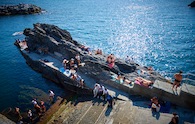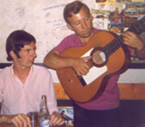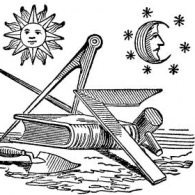Welcome to one of the most active flamenco sites on the Internet. Guests can read most posts but if you want to participate click here to register.
This site is dedicated to the memory of Paco de Lucía, Ron Mitchell, Guy Williams, Linda Elvira, Philip John Lee, Craig Eros, Ben Woods, David Serva and Tom Blackshear who went ahead of us.
We receive 12,200 visitors a month from 200 countries and 1.7 million page impressions a year. To advertise on this site please contact us.
|

|
|
The Guitar in Flamenco
|
You are logged in as Guest
|
|
Users viewing this topic: none
|
|
Login  | |
|

   
Ron.M
Posts: 7051
Joined: Jul. 7 2003
From: Scotland

|
 The Guitar in Flamenco The Guitar in Flamenco
|
|
|
After seeing and hearing the "Fiesta de Otoño" on Ondajerez, I am even more convinced about the guitar being mainly a percussive instrument in Flamenco.
From Gerardo Nuñez, through to Diego del Morao and Moraito it was the same.
I personally think it is (now) impossible to analyse Flamenco guitar from a Western (Classical) music point of view.
It doesn't work in my opinion. Throw your music sheets into the bin! LOL!
A lot of what is played is musical "nonsense" but sounds fantastic in the framework of Flamenco and the compás.
Moraito, for example played a few falsetas that didn't "scan" musically but were brilliant just the same.
Gerardo Nuñez caught me a bit off guard as he played his own stuff which wasn't "Flamenco" but "Flamenco influenced".
He's a damn good musician, and can play Jerez style Flamenco guitar when he chooses to, but he chooses to go his own path.
Which is cool.....Like, nobody is forcing me to play Traditional Scottish music here!
Diego del Morao was extremely interesting.
He has an incredibly rhythmic sound which is quite infectious.
It sounded to me that he was de-tuning the low E string...does anybody know if he uses open tunings?
Zata said that she rated him. Which is worth a lot considering her experience.
All in all, it was a good festival and has got me thinking deeply about the stuff I heard.
After all this is Flamenco here and now, not an album or CD recorded 5 to 10 years ago.
If anything, my impression from what I heard was that "tunes" were old hat and "rhythm" was the buzz word.
Above all, my overall impression was that pure Flamenco was very far from being dead or being overtaken by "fusion".
But overriding that, is my impression that the well constructed "tunes" of players like Paco Peña, or the early Paco de Lucia etc are very definitely "old stuff" in Jerez.
Rhythm is in.
cheers
Ron
|
|
|
|
REPORT THIS POST AS INAPPROPRIATE |
Date Oct. 1 2003 21:12:45
 |
|

   
Ron.M
Posts: 7051
Joined: Jul. 7 2003
From: Scotland

|
 RE: The Guitar in Flamenco (in reply to Jim Opfer) RE: The Guitar in Flamenco (in reply to Jim Opfer)
|
|
|
There have been a few interpretations of my original post, so to clear up any misunderstandings this is what I mean by "percussive".
I believe, (and this is only my own deductions from the music I have heard) that Flamenco guitar pre-Sabicas, was fairly basic, with an emphasis on compas.
Sabicas took it to his own limits, inspiring and influencing players like Paco Peña and Paco de Lucia etc.
During the late 60's and into the late 70's solo Flamenco guitar became quite classical in approach, with very well thought out phrasing and overall composition, leading to a lot of the modern Flamenco "Classics" we all know and love.
From what I hear now, the fashion now appears to be quite "retro", albeit with a very advanced and sophisticated technique!
Rhythm is now taking precidence over musically sounding falsetas.
It's the "new cool", judging from recent stuff I've been listening to.
For someone to have played something like, say, "Panaderos Flamencos" at the Fiesta de Otoño, would (I think) have been embarrasing for the audience and other performers as it would have been considered very uncool and perhaps even "naff", as that is not where the pulse is these days as far as I can see.
Anyway, back on to this "percussive" approach to the guitar.
This does not apply just to playing rasgueado or compas chording etc, but to actual falsetas themselves.
From what I have observed, Flamenco guitarists , when composing will choose to play an "opportunistic" note which lies under the left hand fingers if playing this note makes rhythmic sense, or provides punctuation, even if this note does not make any sense musically.
This is very different from Western style Classical music where a lot of the time the music can be written from the composers's thoughts straight onto paper, or the music transcribed from a piano or harpsichord score etc.
Classical guitarists will then adhere to the script dutifully and try to give their best interpretation of the written work.
Mind you, a lot of this music is fantastic and is our legacy of brilliant minds of the past.
But it does not have anything to do with Flamenco.
Flamenco falsetas are composed on the guitar, by guitarists.
If you look at some very good falsetas from a Classical viewpoint, they are all wrong.
Notes are doubled, trebled, irrelevant notes are added, phrases are abrupty ended seemingly short etc etc.
But this is because it makes rhythmic sense, which is uppermost in the player's mind.
This is why I feel that a Classical approach to the Flamenco guitar is not very helpful.
In Classical, the notes are paramount, in Flamenco the rhythm is all.
If the musicality of the progession has to suffer because of the rhythm, then so be it!
Of course when somebody comes up with a combination of both, then that becomes a classic falseta and is much copied!
Rasgueados?
I was on the FT Forum for a number of years and constantly read posts from students wanting to acquire a very even circular rasgueado.
Why?
Apart from the early 70's PdL albums where that became the short term fashion, I have never heard it since.
All good rasgueados are "lop sided" or "uneven".
That's what provides the rhythm.
Rasgueados that sound like a piece of cardboard being held against the spokes of a spinning bicycle wheel may be impressive as a sort of showpiece to do once or twice in a concert or an album track as a sort of party piece, but they are essentially boring and are not really useful in actual playing.
I think the same goes for the extended, lightning fast picado runs.
You don't hear that much these days.
PdL more or less exhausted that.
Sure it was amazing to hear for the first few times, but these days I think there is just a feeling of, either a comparison to PdL or just general indifference.
I don't think anyone is impressed with that stuff now. Times have moved on.
Anyway, by the looks of it, I'm starting to write a Testament here! LOL!
So Gentlemen, (and Ladies) just to say that these are just my own observations which I don't claim to be correct. Just my current thoughts.
After all I have been known to be wrong in the past.
(Well...maybe just the once... can't really remember now! LOL!)
cheers
Ron
|
|
|
|
REPORT THIS POST AS INAPPROPRIATE |
Date Oct. 2 2003 21:24:38
 |
|

   
gerundino63
Posts: 1743
Joined: Jul. 11 2003
From: The Netherlands

|
 RE: The Guitar in Flamenco (in reply to Ron.M) RE: The Guitar in Flamenco (in reply to Ron.M)
|
|
|
Hi Ron!
Well, you keep the minds working!
I heared the music of Ramon Montoya again, a few days ago, and I just bought the cd of Moraito, Morao y Oro, and I do think, it is not so much different, perhaps it is the retro thing, I believe, that the heart of flamenco is not changing.
Ofcourse you have extremeties, but the heart stays the same.
The flamenco guitar music was and is in fact not ment to written down.
So if you try to capture it in "western "notewriting, you get problems.
I think it was allways like that. If you want to write out Nino ricardo,(1904 - 1972)
or Montoya (1880 -1949) in musical notation, well, you ask for problems.
About 20 years ago you could not get easily a flamenco teaching book, or any other written music.
I remember, I asked my teacher about 15 years ago ( not soooo long ago)
for a Fandangos de Huelva, I was told that it is not on paper, it goes from father to son etc.
So, finally, I think it is not the flamenco that chances that much, but the people that plays it. there are suddenly European, Japanese, American people that ask, "isn't that written down?"
I hope everything is a little bit proper English, Ofcourse it is just my oppinion, and I must say, that my oppinion is a little coloured by my taste of music
greetings, Peter
|
|
|
|
REPORT THIS POST AS INAPPROPRIATE |
Date Oct. 2 2003 22:48:27
 |
|

   
Miguel de Maria
Posts: 3532
Joined: Oct. 20 2003
From: Phoenix, AZ

|
 RE: The Guitar in Flamenco (in reply to Ron.M) RE: The Guitar in Flamenco (in reply to Ron.M)
|
|
|
|
I enjoy flamenco and the special atmosphere and energy that this folkloric form has, but I also enjoy the virtuoso, flamenco-influenced pieces by those such as Paco de Lucia. My goal would be to do both, though if I had to choose one, I would choose the latter. I'm a guitarist, and I live in America, where there are few good dancers or singers and absolutely no audience. However, you can scatter in a bit of flamenco here and there and people will appreciate it. If you could play Paco's stuff I don't care, anybody would be impressed and enjoy it. Last night, I played a gig of Santana and Ottmar Liebert as well as a bunch of originals similar to the same (my partner has a CD), but the biggest applause when I played an old-school Soleares for kicks! The room got quiet and a certain magic came over the place for just awhile. I don't take too much credit, but it was probably the most inspired I ever played this simple piece. Playing with dancers or accompanying singers, what little I have done, was wonderful, but I think that I could generate the same fun with a band, say percussionist and bassist... doing a flamenco-inspired thing, hopefully with more duende than the current crop of "nouveaites".
|
|
|
|
REPORT THIS POST AS INAPPROPRIATE |
Date Oct. 3 2003 18:57:21
 |
|
 New Messages New Messages |
 No New Messages No New Messages |
 Hot Topic w/ New Messages Hot Topic w/ New Messages |
 Hot Topic w/o New Messages Hot Topic w/o New Messages |
 Locked w/ New Messages Locked w/ New Messages |
 Locked w/o New Messages Locked w/o New Messages |
|
 Post New Thread
Post New Thread
 Reply to Message
Reply to Message
 Post New Poll
Post New Poll
 Submit Vote
Submit Vote
 Delete My Own Post
Delete My Own Post
 Delete My Own Thread
Delete My Own Thread
 Rate Posts
Rate Posts
|
|
|
Forum Software powered by ASP Playground Advanced Edition 2.0.5
Copyright © 2000 - 2003 ASPPlayground.NET |
6.201172E-02 secs.
|


 Printable Version
Printable Version










 New Messages
New Messages No New Messages
No New Messages Hot Topic w/ New Messages
Hot Topic w/ New Messages Hot Topic w/o New Messages
Hot Topic w/o New Messages Locked w/ New Messages
Locked w/ New Messages Locked w/o New Messages
Locked w/o New Messages Post New Thread
Post New Thread